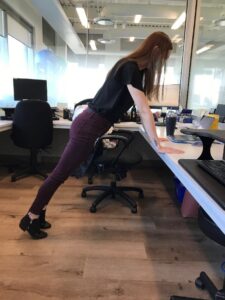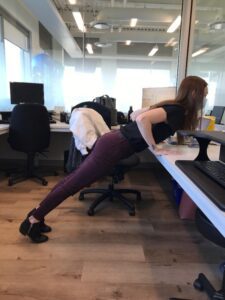The pandemic has brought about many changes to our lives since it began. For many, our homes have become our offices. Working from home can be extremely convenient in the sense that you don’t have to get up, get dressed and drive to the office every weekday. But the flip side of this situation is that people working from home are moving less.
We are spending longer periods of time sitting in front of our electronic devices, in zoom meetings or catching up on emails, when you are at home there is nothing stopping you from doing that from the comfort of your couch or even from your bed. Those might seem like the best places to achieve peak productivity, but they are the worst places to maintain good posture and can be the culprit of neck, back and shoulder aches and pains. If you have started to notice that your body hurts a little bit more since you started working from home then we’ve got a couple ways to help you to reduce your pandemic-induced pains!
The first thing you need to consider is your posture.
You’ve probably googled “how to fix my posture” once or twice since your aches and pains began, but it’s not as easy as just sitting up straight and bringing your shoulders back.
Your workspace and computer need to be arranged in a way that keeps you in good posture.
Ideally, you should have a chair that allows your feet to touch the floor, if you don’t, placing a stool or box at your feet solves that problem. Your keyboard should be close enough to your body that your elbows can sit at your sides with your hands extended straight forwards.
Where is your monitor?
You never want to be reaching forwards to type or you can create tension and soreness in your upper neck and shoulders. The top of your monitor should be at eye level, and it should be close enough to you that you don’t have to reach your head forwards into what we call “forward head posture”. Keeping your head and neck in good alignment alleviates unnecessary stress on your neck and shoulder muscles trying to support your bowling ball-sized head against the forces of gravity! The last thing you want to consider is if you talk on the phone regularly for your work, try using headphones or a headset to talk instead of holding the phone up to your ear or pinching the phone between your ear and shoulder.
Standing helps
Now that you have the most ergonomic desk set up and you are sitting up nice and tall while you work…you should stand! One of the best ways to avoid poor posture and the resulting pains that it can cause is to get up regularly and MOVE. One of the biggest downsides to working from home is we don’t have the social aspect of work to get us up and out of our workspace in regular intervals.
Keep moving throughout the day
All our coffee breaks, meetings and lunch breaks can be taken in the exact same spot on our couch where we work. Throughout your workday, you should be taking a lot of mini-movement breaks. A movement break is a simple and relatively short break where you change your body position, stand up, walk around, and give your body a break from being stuck in the same positions for too long.
A good rule of thumb for how frequently to take a movement break is 30:2.
For every 30 minutes you are sitting you should spend about 2 minutes moving around and changing your body position.
You can use those two minutes to grab a snack or a glass of water, do some stretching or even a couple of exercises to keep you awake and focussed. If 30:2 seems unattainable set a goal that works best for you and set a timer on your phone or your computer to remind you when it’s time to get up and move your body. If it’s possible for you to stand while you work, that is a great alternative to sitting and it’s a great way to take a movement break while still being productive.
Take a movement break
Movement breaks are good to break up your day and stop you from sitting for too long, and the best and most effective movement breaks to help with neck, back and shoulder pains are going to be the ones that involve exercises that strengthen the muscles in those areas. Often, the sensation of tightness in our muscles is an indicator that that muscle is too weak to support you in the movements you are using it for.
The tightness in your muscles is a cry for help and exercises to strengthen those muscles are the help they need. So, what can you do? Deskercise! Exercises that are created specifically for those of us that spend too much of our time sitting and working at a desk.
You don’t need a gym or weights to get your reps in because we are bringing the exercise right to your desk/workspace.
These stretches and exercises are targeted specifically to counteract the classic signs of poor posture that lead to neck and back pain: forward head posture or chin poking, shoulders rounding forwards, and the hunched upper back. The next time you feel stiff and sore from sitting for too long, move your body and try a few of these stretches and exercises:
Isometric Shoulder External Rotation
Sit up tall in your chair like a string is pulling you up from the crown of your head. Squeeze your shoulder blades together and press our hands out into your armrests. You should feel your shoulder muscles activate in your upper back. This helps keeps your shoulders in good position and activates your postural muscles!
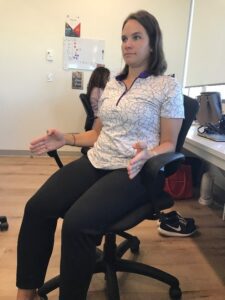
Seated Spinner Stretch
Kick on leg out straight and keep the other bent while sitting in your chair, turn your shoulders so they are inline with your straight leg and slide your hand down as far as you can. Then reach your free hand over your head. You should feel a great stretch through the side of your lower back all the way up to your shoulder!
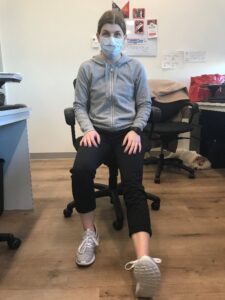
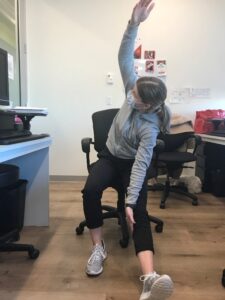
W Band Pull
Grab a resistance band or something stretchy and hold it in your hands with your palms facing forwards. Pull your hands apart making a ‘W’ with your arms and squeeze your shoulder blades together. This helps strengthen your upper back!
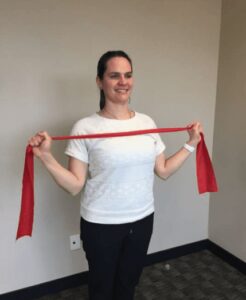
Desk Push Up
Stand in front of your desk with your hands on the edge about shoulder width apart. Keep your body completely flat and lower yourself towards the desk bringing your elbows to your sides. Push back up maintaining your flat body position the entire time.
